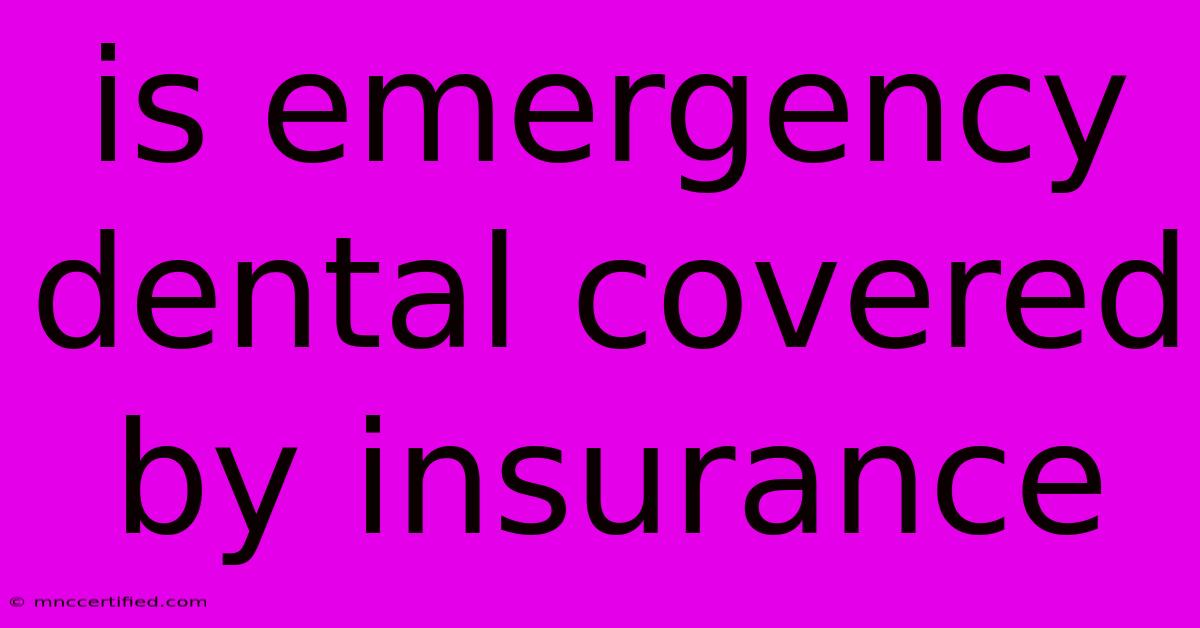Is Emergency Dental Covered By Insurance

Table of Contents
Is Emergency Dental Covered by Insurance? A Comprehensive Guide
A sudden toothache, a chipped tooth, or a lost filling can be a real pain, literally! But what about the financial pain? When unexpected dental emergencies arise, many people wonder: is emergency dental covered by insurance? The answer, unfortunately, is not a simple yes or no.
Understanding Dental Insurance Coverage
Dental insurance, like any other insurance, works on a system of coverage limits, exclusions, and pre-existing conditions. It's crucial to understand the specifics of your individual plan to determine the extent of emergency dental coverage. Here's a breakdown of factors that influence your coverage:
- Plan Type:
- Preventative Plans: Primarily cover routine checkups, cleanings, and basic dental care. Emergency coverage is usually limited.
- Comprehensive Plans: Offer broader coverage, including emergency procedures like fillings, extractions, and root canals.
- Deductible: You'll often need to meet a deductible before coverage kicks in.
- Co-pay: Even with coverage, you might still have to pay a co-pay for each service.
- Annual Maximum: There's usually a maximum amount your plan will pay out annually.
Common Emergency Dental Procedures and Coverage
Here's a look at some common emergency dental procedures and how insurance typically handles them:
1. Toothache: This is usually covered, but often only after you visit your dentist for a diagnosis. The treatment (filling, extraction, root canal) may then be covered, depending on your plan.
2. Cracked or Chipped Tooth: Treatment like bonding or crowns may be covered, but the extent of coverage varies.
3. Lost Filling or Crown: These are often covered, especially if they're part of a previous treatment covered by your plan.
4. Knocked-Out Tooth: Coverage for reimplantation is often provided, but it's crucial to act quickly.
5. Abscessed Tooth: Emergency procedures like draining and antibiotics are usually covered.
6. Gum Infection: Treatment for gum infections can be covered, though specific details may vary.
What to Do in a Dental Emergency
1. Contact Your Dentist: Call your regular dentist first. If they are unavailable, look for an emergency dentist in your area.
2. Contact Your Insurance Provider: Call your insurance provider to understand your coverage specifics and get pre-authorization if needed.
3. Seek Immediate Treatment: Don't delay treatment, especially for serious emergencies like a knocked-out tooth.
4. Keep Records: Keep all receipts, invoices, and medical records related to the emergency for insurance claims purposes.
Tips to Optimize Your Coverage
- Read Your Policy Carefully: Understand the fine print of your plan and what's covered.
- Ask Questions: Don't hesitate to contact your insurance provider or dentist for clarification.
- Maintain Regular Checkups: Routine dental care can prevent emergencies and help identify potential issues early on.
It's important to note that insurance policies vary, so always check with your specific provider to confirm coverage. Being aware of your dental coverage and following these tips can make a significant difference in managing your emergency dental costs.

Thank you for visiting our website wich cover about Is Emergency Dental Covered By Insurance. We hope the information provided has been useful to you. Feel free to contact us if you have any questions or need further assistance. See you next time and dont miss to bookmark.
Featured Posts
-
Salvadors Tax Insurance And Notary Public
Nov 08, 2024
-
Manchester United Vs Paok Europa League Live Stream
Nov 08, 2024
-
The Day Of The Jackal On Sky Atlantic Review
Nov 08, 2024
-
Coventry City Faces Criticism After Dismissal
Nov 08, 2024
-
Starbucks Holiday Drinks Food And Cups Arrive
Nov 08, 2024